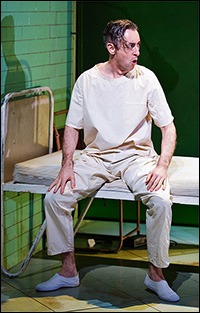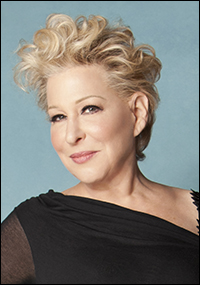
*
Producer Ken Davenport didn't have to think too long or too hard when he signed on to co-produce the 2009 Will Ferrell solo show You're Welcome America, in which the comedian reprised his "Saturday Night Live" impression of President George W. Bush.
"Why I did it was I'm a huge Will Ferrell fan," said Davenport. "I know the effect that he had on me as an audience member, and I knew the effect he would have on other people."
A Broadway show starring Will Ferrell, then at the height of his film fame, was hardly what you'd call a risky bet. And, it paid off for Davenport and his many co-producers. The show turned a very healthy profit.
Shows like Ferrell's and other box-office-bonanza, star-driven, solo outings like Hugh Jackman, Back on Broadway and 700 Sundays starring Billy Crystal are the gold standards on Broadway. For a producer, hitching on to one can be the equivalent of minting money. But bankable stars are only one of the factors that draw a producer to a one-person show.
This spring, Broadway will see a rush of solo outings, each very different from the last. Already open is Ann, actor-playwright Holland Taylor's take on the charismatic Texas governor Ann Richards. On April 21, Alan Cumming opens in his nearly solitary rendition of Shakespeare's Macbeth (he gets a little help from a couple other actors, but plays most roles himself). The day after that is the premiere of The Testament of Mary, starring Fiona Shaw as the mother of Jesus. A couple days later, John Logan's I'll Eat You Last, featuring Bette Midler as legendary Hollywood agent Sue Mengers, takes it bow.
| |
 |
|
| Alan Cumming |
"Simply put, I'm attracted to excellent theatre," he said. "When you look at the portfolio of shows I've done, they're very diverse. I don't think a one-man show is very different from a small play, if you will. Investors are attracted to great theatre."
Still, "great theatre" isn't always enough to attract an audience. Davenport knows that, but feels Macbeth has enough arrows in its quiver to hit the bullseye.
"I'm a big believer that the Broadway market is one of the most cluttered markets of any business market in the world," he explained. "In order to stand out in that market, you have to have something that is utterly unique and markets itself. [With] this show, there are so many elements that are unique. First, there's Alan, who is one of the most versatile actors we've seen. It's a one-person Macbeth. It's set in a psychiatric ward. It's the Scottish play performed by a Scottish actor. All those things start to come together for me, and I go, 'Wow, this is unique experience.'"
He added that if the proposition had been Cumming playing the Scottish king in a conventional staging of Macbeth, he might not have been tempted to get involved. "I think it was more attractive in that it's Alan Cumming playing all the roles." Harriet Newman Leve has plenty of experience producing solo works on Broadway. Her many credits include Twilight: Los Angeles, 1992 starring Anna Deveare Smith and The Good Body with Eve Ensler. With Ann, she came to the show already interested in the subject matter.
"I was a big fan of Richards," said Leve, "particularly her keynote speech at the Democratic convention. That really stood out in my mind."
Leve attended performances of Taylor's play in Texas and Washington, D.C., before deciding to be part of the Broadway mounting. For her, the decision was all about love.
"What happens for me—how I decide to produce a show—is I either read it or go to see it, and fall in love with it," she said. "If I fall in love with it and think it's important, then I jump in. With Ann, it's a combination of Holland Taylor's terrific talent as an actress, and her really capturing Ann Richards in such a winning and witty way."
| |
 |
|
| Bette Midler | ||
| Photo by Jonathan Pushnik |
With I'll Eat You Last, her latest one-person project, however, there was no audience from a previous staging to influence her decision. In this case, it was the play that won her over.
"When John Logan gave me the script to read, I wanted to produce it right away," she said. "I didn't know very much about Sue Menger, but after reading the play I only wanted more. John had done such a terrific job and it is such a compelling story that I wanted her to be my friend and I wanted to spend time with her."
Conventional wisdom about solo shows says that their low overhead make them alluring to producers and investors—fewer expenses lead to a quicker recoupment. But, say producers, it's not necessarily as simple as that.
"I always say it depends on the show," stated Madover. "There are so many people that go into creating any Broadway show that the number of people on stage can actually be a very small part of the budget." Also, if that one person on stage is a marquee name, it can be a double-edged sword. You get the big name, but you may also be saddled with a big salary.
"If you keep the expenses down," there's a chance at making a profit, said Leve. "If you have somebody that's a megastar and they're demanding a large salary, then it can be difficult."
In fact, Leve and her fellow producers' talent for keeping the budget of Ann under control is one of the things that made the show tempting to investors. "It was very attractive financially," she explained. "Typically, investors look a little bit more carefully at doing a one-person show compared to a show that has a fuller cast. If it's a really good show and the expenses aren't too high, it's attractive."
Madover thinks that the creative team also has a lot to do with luring backers. "In this case, to have a play by John Logan and directed by Joe Mantello, starring Bette Midler is a pretty outstanding threesome."
Once you have all the money in place, and the theatre booked, marketing the show can also prove a challenge. The person on stage not only has to perform on stage, but perform off-stage as well, doing interviews in support of the production.
"I think a solo show brings a lot of pressure on the person on stage, because there is literally nobody else," said Madover. "This is very hard for marketing because this person has to perform, as well as be responsible for tons of press and appearances. As a producer you don't want to exhaust them, so you try to limit things. So that can be difficult."










